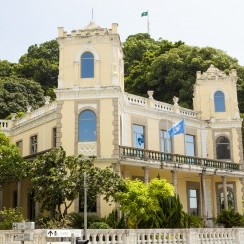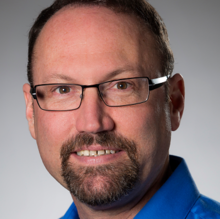The Association for Progressive Communications (APC) is an international network of organizations that was founded in 1990 to provide communication infrastructure, including Internet-based applications, to groups and individuals who work for peace, human rights, protection of the environment, and sustainability. Pioneering the use of ICTs for civil society, especially in developing countries, APC were often the first providers of Internet in their member countries.
Narendra Krishna Karmarkar is an Indian mathematician. Karmarkar developed Karmarkar's algorithm. He is listed as an ISI highly cited researcher.

Charles Eric Leiserson is a computer scientist, specializing in the theory of parallel computing and distributed computing, and particularly practical applications thereof. As part of this effort, he developed the Cilk multithreaded language. He invented the fat-tree interconnection network, a hardware-universal interconnection network used in many supercomputers, including the Connection Machine CM5, for which he was network architect. He helped pioneer the development of VLSI theory, including the retiming method of digital optimization with James B. Saxe and systolic arrays with H. T. Kung. He conceived of the notion of cache-oblivious algorithms, which are algorithms that have no tuning parameters for cache size or cache-line length, but nevertheless use cache near-optimally. He developed the Cilk language for multithreaded programming, which uses a provably good work-stealing algorithm for scheduling. Leiserson coauthored the standard algorithms textbook Introduction to Algorithms together with Thomas H. Cormen, Ronald L. Rivest, and Clifford Stein.
The International Federation for Information Processing (IFIP) is a global organisation for researchers and professionals working in the field of computing to conduct research, develop standards and promote information sharing.

David A. Bader is a Distinguished Professor and Director of the Institute for Data Science at the New Jersey Institute of Technology. Previously, he served as the Chair of the Georgia Institute of Technology School of Computational Science & Engineering, where he was also a founding professor, and the executive director of High-Performance Computing at the Georgia Tech College of Computing. In 2007, he was named the first director of the Sony Toshiba IBM Center of Competence for the Cell Processor at Georgia Tech.

The United Nations University Institute in Macau, formerly the United Nations University International Institute for Software Technology and then United Nations University Institute on Computing and Society, is a United Nations University global think tank conducting research and training on digital technologies for sustainable development, encouraging data-driven and evidence-based actions and policies to achieve the Sustainable Development Goals. UNU-Macau is located in Macau, China.

Rosalind Wright Picard is an American scholar and inventor who is Professor of Media Arts and Sciences at MIT, founder and director of the Affective Computing Research Group at the MIT Media Lab, and co-founder of the startups Affectiva and Empatica.
The terms design computing and other relevant terms including design and computation and computational design refer to the study and practice of design activities through the application and development of novel ideas and techniques in computing. One of the early groups to coin this term was the Key Centre of Design Computing and Cognition at the University of Sydney in Australia, which for nearly fifty years pioneered the research, teaching, and consulting of design and computational technologies. This group organised the academic conference series "Artificial Intelligence in Design (AID)" published by Springer during that period. AID was later renamed "Design Computing and Cognition (DCC)" and is currently a leading biannual conference in the field. Other notable groups in this area are the Design and Computation group at Massachusetts Institute of Technology's School of Architecture + Planning and the Computational Design group at Georgia Tech.
BytesForAll is a South Asian initiative to focus on how information technology and the internet can help in taking up social development issues. It is one of the oldest ICT4D networks in South Asia. It was launched at a time when ICT4D was yet to become a buzz-word on the development circuit, and was still largely unnoticed for its potential.

Amy Susan Bruckman is a professor at the Georgia Institute of Technology affiliated with the School of Interactive Computing and the GVU Center. She is best known for her pioneering research in the fields of online communities and the learning sciences. In 1999, she was selected as one of MIT Technology Review's TR100 awardees, honoring 100 remarkable innovators under the age of 35.
Krishna V. Palem is a computer scientist and engineer of Indian origin and is the Kenneth and Audrey Kennedy Professor of Computing at Rice University and the director of Institute for Sustainable Nanoelectronics (ISNE) at Nanyang Technological University (NTU). He is recognized for his "pioneering contributions to the algorithmic, compilation, and architectural foundations of embedded computing", as stated in the citation of his 2009 Wallace McDowell Award, the "highest technical award made solely by the IEEE Computer Society".
Rebecca Elizabeth "Beki" Grinter is a professor in the School of Interactive Computing in the College of Computing at the Georgia Institute of Technology. She is affiliated with the RIM@GT, the GVU Center and the Scheller College of Business. Grinter's research lies generally in the fields of human-computer interaction (HCI) and computer-supported cooperative work (CSCW). She has chaired and published papers in top-tier academic conferences in these fields. Her research and expert opinion on technology have also been reported in major news media sources.
Zhang Hongjiang is a Chinese computer scientist and executive. He served as CEO of Kingsoft, managing director of Microsoft Advanced Technology Center (ATC) and chief technology officer (CTO) of Microsoft China Research and Development Group (CRD). Hongjiang is currently Chairman of BAAI. In 2022, he was elected to the National Academy of Engineering for his technical contributions and leadership in the area of multimedia computing.

Kentaro Toyama is a computer scientist and international development researcher, who works on the relationship of technology and global development. He is the W. K. Kellogg Professor at the University of Michigan School of Information and author of Geek Heresy: Rescuing Social Change from the Cult of Technology.

Shwetak Naran Patel is an American computer scientist and entrepreneur best known for his work on developing novel sensing solutions and ubiquitous computing. He is the Washington Research Foundation Entrepreneurship Endowed Professor at the University of Washington in Computer Science & Engineering and Electrical Engineering, where he joined in 2008. His technology start-up company on energy sensing, Zensi, was acquired by Belkin International, Inc. in 2010. He was named a 2011 MacArthur Fellow. In 2016, He was elected as an ACM Fellow for contributions to sustainability sensing, low-power wireless sensing and mobile health and received Presidential Early Career Award for Scientists and Engineers (PECASE). He was named the recipient of the 2018 ACM Prize in Computing for contributions to creative and practical sensing systems for sustainability and health.

Irfan Aziz Essa is a professor in the School of Interactive Computing of the College of Computing, and adjunct professor in the School of Electrical and Computer Engineering at the Georgia Institute of Technology. He is an associate dean in Georgia Tech's College of Computing and the director of the new Interdisciplinary Research Center for Machine Learning at Georgia Tech (ML@GT).

Ümit V. Çatalyürek is a professor of computer science at the Georgia Institute of Technology, and Adjunct Professor in department of Biomedical Informatics at the Ohio State University. He is known for his work on graph analytics, parallel algorithms for scientific applications, data-intensive computing, and large scale genomic and biomedical applications. He was the director of the High Performance Computing Lab at the Ohio State University. He was named Fellow of the Institute of Electrical and Electronics Engineers (IEEE) in 2016 for contributions to combinatorial scientific computing and parallel computing.
Jofish Kaye is an American and British scientist specializing in human-computer interaction and artificial intelligence. He runs interaction design and user research at anthem.ai, and is an editor of Personal & Ubiquitous Computing.

Ashutosh Dutta is a computer scientist, engineer, academic, author, and an IEEE leader. He is currently a Senior Scientist, 5G Chief Strategist at Johns Hopkins University Applied Physics Lab, APL Sabbatical Fellow, Adjunct Faculty and ECE Chair for EP at Johns Hopkins University. He is the Chair of IEEE Industry Connection O-RAN Initiative and Co-Chair for IEEE Future Networks Initiative.










